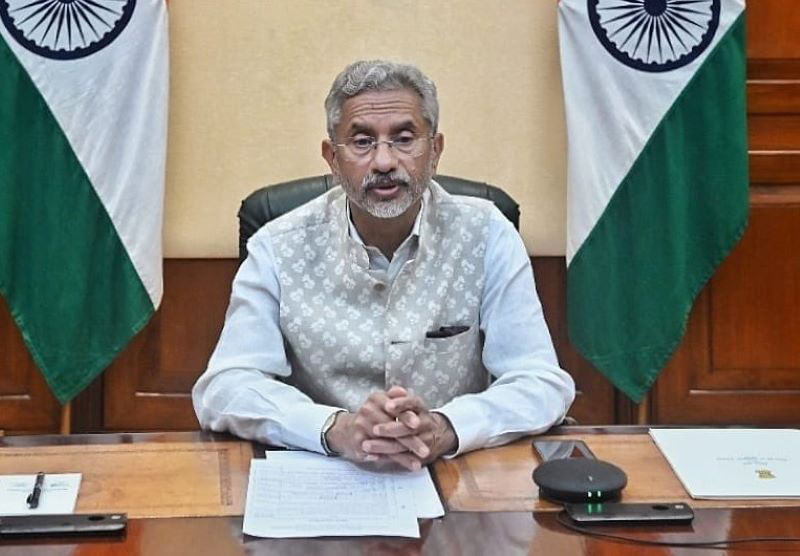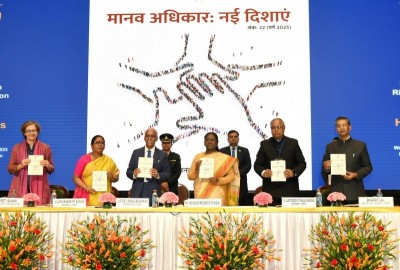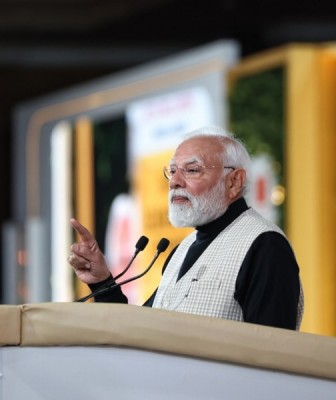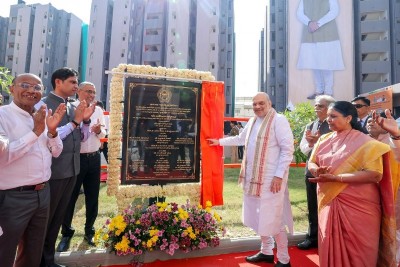 Jaishankar
Jaishankar
India emerging as trusted global electronics manufacturing partner: Jaishankar at SemiconIndia 2023
External Affairs Minister S Jaishankar has emphasized on India’s role in critical and emerging technologies and importance of Nation’s growth in the electronics sector, particularly semiconductors, addressing the last day of the three-day SemiconIndia 2023
He stressed on India’s growing presence as a trusted global electronics manufacturing partner. In this regard, the international collaborations with the US, Japan and Australia and upcoming opportunities with other like-minded countries hold significant importance.
The final day of the three-day SemiconIndia 2023 Conference attracted diverse participation ranging from industry, start-ups, academia and government.
The insightful sessions and engaging talks showcased the importance of critical aspects pertaining to semiconductor manufacturing and steps being taken to ensure the development of a robust, resilient and sustainable semiconductor ecosystem.
India firmly believes in “Vasudhaiva Kutumbakam” or “One Earth, One Family, One Future”, i.e., equitable growth and shared future for all.
Keeping this in view, a dedicated panel discussion led by Shri Anshuman Tripathi, Member, NSCS was held on “International Collaboration for Trusted and Resilient Semiconductor Supply Chain”.
The panellists, Mike Hankey, Consul General, US Embassy; Kyoko Hokugo, Minister, Economy and development, Japan; Georgina Rose Mckay, First Secretary, Australian High Commission and Prof Arijit Raychowdhury, Georgia Tech University explored the potential of global partnerships in enhancing the semiconductor industry, with a particular focus on India's role in becoming a major player in semiconductor manufacturing, research, talent exchange, clean energy transitions and critical minerals exploration.
The panel discussion on opportunities and challenges in emerging technologies featured notable experts, including Shri Santhosh Kumar, Texas Instruments; Jaya Jagadish, AMD; Shri Hitesh Garg, NXP Semiconductors, and Prof Udayan Ganguly, IIT Bombay.
The discussion revolved around key innovations in semiconductors, future of automotive semiconductors, role of academia in advancing semiconductor technology and sustainability in the semiconductor ecosystem.
An engaging discussion on the topic “Catalysing New India’s Techade” with Amitabh Malhotra, MD, HSBC India and Ridham Desai, MD, Morgan Stanley reflected on the exciting prospects of setting up a semiconductor ecosystem in India, emphasizing that the country’s capacity to deliver both consumption and production makes it attractive to multinational companies.
Access to capital was discussed as crucial for growth in the semiconductor industry and various financing avenues, including external commercial borrowing and equity investments were deliberated.
Panel discussions were organised on the readiness assessment for the semiconductor ecosystem.
Pankaj Mohindroo, Chairman ICEA moderated the session on India’s Growing Presence in Electronics GVCs.
The panellists, Sudhir Pillai, MD, Corning India; Aman Gupta, CMO and CoFounder, boAt; Raminder Singh, Chairman, Radiant; Nandini Tandon, Venture Capitalist and Ravi Bhatkal, Element Solutions discussed the remarkable growth and potential of the electronics sector.
Indian brand boAt shared their journey of building a domestic brand and moving from imports to domestic manufacturing, supported by government policies and schemes, including the Phased Manufacturing Programme.
Corning India emphasized the shift from a ‘slogan’ to a ‘belief’ in ‘Make in India’, calling for a manufacturing strategy to build a robust electronics manufacturing ecosystem. Challenges in the sector were discussed including the need for comprehensive manufacturing strategies, uniform labour codes and insurance cover.
The panel led by Sanjay Gupta, Chairman, IESA and other esteemed panellists, Akshay Tripathi, Government of UP; Vijay Nehra, Government of Gujarat; Dr E V Ramana Reddy, Government of Karnataka; Sujai Karampuri, Government of Telangana and representative of Government of Tamil Nadu demonstrated the preparedness of various Indian States to attract investments, develop infrastructure, and nurture talent in the electronics and semiconductor industries, playing a vital role in India’s growth in this sector.
The panelists also discussed the importance of financial and non-financial support for semiconductor companies, the need for fabless entrepreneurship, and the creation of State funds to support startups.
The deliberations on “Global Semiconductor Talent Capital” explored the implementation of Semicon India FutureSkills Talent Roadmap for making India as a Semiconductor Talent Nation.
Jaya Jagadish, AMD India; Prof T G Sitharam, Chairman, AICTE; Binod Nair, GlobalFoundries; Srinivas Satya, Applied Materials; Rangesh Raghavan, Lam Research; Prof Udyan Ganguly, IIT Bombay and Dr Vijay Raghunathan, Purdue University showcased India’s commitment to becoming a semiconductor talent nation through strategic planning, collaboration, and workforce investment.
Rajesh Kumar Singh, Secretary, DPIIT moderated a session on creating a globally competitive compliance and regulatory framework.
He highlighted the rapid changes in the ease of business and FDI processes, with a focus on Ease of Doing Business at the States level.
Alkesh Kumar Sharma, Secretary, MeitY emphasized the importance of handholding global investors, tax reforms, a whole of Government approach and policy stability in the decision-making process for investors.
Pragya Sahay Saksena, Member, CBDT highlighted how the Government has been proactive in implementing structural changes and industry consultations and requirements.
Rajeev Talwar, Member, CBIC outlined features to streamline operations in the semiconductor ecosystem, focusing on contactless, paperless and faceless customs processes.
Gursharan Singh, SVP, Micron, appreciated the government’s fast approach to the Advance Pricing Agreement.
Hari Om Rai, MD, Lava highlighted the vision of Industry that India will manufacture 50 per cent of the global electronics by 2033.
Jaya Jagadish, AMD India gave the closing remarks at SemiconIndia 2023.
The second edition of SemiconIndia marked a significant shift, with the question changing from “why invest in India” to “why not invest in India” in the semiconductor industry, as noted by Prime Minister Narendra Modi.
She noted that the focus on emerging technologies like chiplet architecture and material sciences is crucial to meet the growing chip demand.
Initiatives by the government for skilled talent and support for startups and R&D shall fuel innovation in the sector.
The second edition of SemiconIndia has placed India at the center of the conversation on the future of technology in general and future of semiconductors in particular, by engaging global companies at the highest level of leadership and academia. It marks the formal launch pad of India’s semiconductor journey which envisions making India a global hub for electronics and semiconductors.
Support Our Journalism
We cannot do without you.. your contribution supports unbiased journalism
IBNS is not driven by any ism- not wokeism, not racism, not skewed secularism, not hyper right-wing or left liberal ideals, nor by any hardline religious beliefs or hyper nationalism. We want to serve you good old objective news, as they are. We do not judge or preach. We let people decide for themselves. We only try to present factual and well-sourced news.







